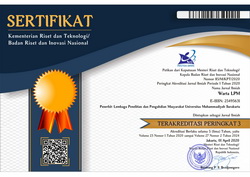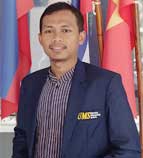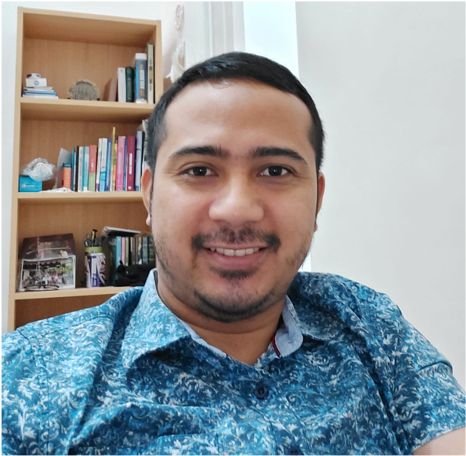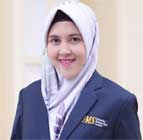Developing Online Laboratory as an English Learning Media for Muhammadiyah Schools in Bantul Regency
DOI:
https://doi.org/10.23917/warta.v26i3.1460Keywords:
language laboratory, moodle, online, scormAbstract
The Online Language Lab is an innovation aimed at revitalizing English language practice activities in schools, replacing the analog language labs that have long been abandoned by many schools in Indonesia. It is known that English language learning focused only on materials such as reading, pronunciation, and speaking without practice can hinder students' ability to communicate effectively in English. We have successfully developed an internet-based Online Language Lab by combining several supporting technologies, including Learning Management System (LMS), speech to text converter, text to speech converter, p5 JavaScript library, Moodle app, and SCORM, to create an interactive online language lab. Students can learn English independently with learning modules tailored to their respective abilities. Our Online Language Lab system has been tested in a school to measure its usability, and the results were very positive. In addition, we also conducted experiments to assess the feasibility of our system and the results showed that it can be implemented widely in various schools in Indonesia. It is expected that with the Online Language Lab, students can significantly improve their English language skills and be better prepared to face global challenges in the future. This is a crucial breakthrough in improving the quality of English language education in Indonesia.
References
Brooke, J. (1995). SUS: A Quick and Dirty Usability Scale. In Usability Eval. Ind. (1st ed., Vol. 189). CRC Press.
Davies, R., & West, R. E. (2014). Technology Integration in Schools. Handbook of Research on Educational Communications and Technology, 841–853.
Dwinaya, L., & Caromawati, C. (2022). Language Labs: The Loop of The Features, Materials, And Functions. IEFLJ) Indonesian EFL Journal, 8(1), 33–44. https://doi.org/10.25134/ieflj.v8i1.5585
Fajemidagba Ayodele, M. (2020). The Influence of Standard Language Laboratory on the Effective Teaching and Learning of English Language in Nigeria. Language in India , 20(7), 164–180. https://web.s.ebscohost.com/abstract?site=ehost&scope=site&jrnl=19302940&AN=144840783&h=6n08u8O6KLNtbreUzLyPoZ7%2f8sloHHdtfk0oEz173z2h6tA1i6z3CLu05bU%2fPDlyohqNB1DpArPM2o99PUNLUQ%3d%3d&crl=c&resultLocal=ErrCrlNoResults&resultNs=Ehost&crlhashurl=login.aspx%3fdirect%3dtrue%26profile%3dehost%26scope%3dsite%26authtype%3dcrawler%26jrnl%3d19302940%26AN%3d144840783
Gilakjani, A. P., & Ahmadi, M. R. (2011). A Study of Factors Affecting EFL Learners’ English Listening Comprehension and the Strategies for Improvement. Journal of Language Teaching and Research, 2(5). https://doi.org/10.4304/jltr.2.5.977-988
Hlásná, P., Klímová, B., & Poulová, P. (2017). Use of Information and Communication Technologies in Primary Education-A Case Study of the Czech Republic. In International Electronic Journal of Elementary Education (Vol. 9, Issue 3). www.iejee.com
Kapenieks, J. (2013). User-friendly e-learning Environment for Educational Action Research. Procedia Computer Science, 26, 121–142. https://doi.org/https://doi.org/10.1016/j.procs.2013.12.012
Khusanov, K., & Sulaymonov, B. (2018). Developing user interface for an e-learning platfor. ACTA of Turin Polytechnic University in Tashken, N4, 11–18.
Krishna, D. (2021). Importance of Language Laboratory in Developing Language Skills. JURNAL ARBITRER, 8(1), 101. https://doi.org/10.25077/ar.8.1.101-106.2021
Lou, Y., & Xu, P. (2015). Integrating Internet-Based Language Laboratory in Teaching Intensive Reading at Non-English-Majored-Graduate Level. Creative Education, 06(14), 1610–1615. https://doi.org/10.4236/ce.2015.614162
Mohammed Nasser Hassan Ja’ashan, M. (2020). The Challenges and Prospects of Using E-learning among EFL Students in Bisha University. Arab World English Journal, 11(1), 124–137. https://doi.org/10.24093/awej/vol11no1.11
Nelson, K. M., Nelson, H. J., & Ghods, M. (1997). Technology flexibility: conceptualization, validation, and measurement. Proceedings of the Thirtieth Hawaii International Conference on System Sciences, 3, 76–87 vol.3. https://doi.org/10.1109/HICSS.1997.661572
Peres, S. C., Pham, T., & Phillips, R. (2013). Validation of the System Usability Scale (SUS): SUS in the Wild. Proceedings of the Human Factors and Ergonomics Society Annual Meeting, 57(1), 192–196. https://doi.org/10.1177/1541931213571043
Pulasthi, L. K., & Gunawardhana, D. (2016). Using Multimedia as an Education Tool. 9th Annual International Conference on Computer Games Multimedia & Allied Technologi. https://doi.org/10.5176/2251-1679_CGAT16.15
Saminathan, V. (2021). Problem s of Online Classes. International Journal of Academic Research Reflectoor, 9, 1–4. https://doi.org/10.6084/m9.figshare.13573550
Sulistiyo, U. (2015). Improving English as a Foreign Language Teacher Education in Indonesia: The Case of Jambi University. RMIT university.
Violante, M. G., & Vezzetti, E. (2015). Virtual interactive e-learning application: An evaluation of the student satisfaction. Computer Applications in Engineering Education, 23(1), 72–91. https://doi.org/10.1002/CAE.21580
Yordanova, L., Angelova, N., & Kiryakova, G. (2015). Interactive Models Of E-Learning For Active Learning. ARTTE Applied Researches in Technics, Technologies and Education, 3, 336–343. https://doi.org/10.15547/artte.2015.04.008
Zahir Wali, A., & Ehsan Omaid, M. (2020). The Use of Smartphones as an Educational Tool in the Classroom: Lecturers’ Perceptions. Lecturers’ Perceptions. The Use of Smartphones as an Educational Tool in the Classroom, 15(16), 238–247. https://doi.org/10.3991/ijet.v15i16.14179
Zein, S., Sukyadi, D., Hamied, F. A., & Lengkanawati, N. S. (2020). English language education in Indonesia: A review of research (2011–2019). Language Teaching, 53(4), 491–523. https://doi.org/10.1017/S0261444820000208
Downloads
Submitted
Accepted
Published
How to Cite
Issue
Section
License
Copyright (c) 2023 Warta LPM

This work is licensed under a Creative Commons Attribution 4.0 International License.















